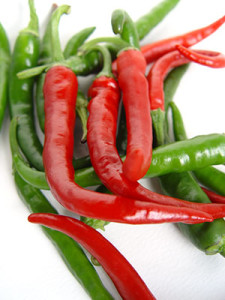Do you suffer from chronic inflammation? According to the Centers of Disease Control and Prevention (CDC), chronic inflammation contributes to seven of the top ten leading causes of death. It’s commonly associated with heart disease, cancer, respiratory disease, stroke, diabetes, Alzheimer’s and nephritis. Thankfully, there are several all-natural herbs that can counteract the effects of inflammation, offering relief to its potentially life-threatening effects.
#1) Tumeric
Tumeric is an herbaceous perennial native to southeastern India. This spicy herb is responsible for giving curry its yellow color – but it’s also used to treat and prevent bodily inflammation. According to a study published in the journal Scientific Research, tumeric’s anti-inflammatory power is comparative to medications such as Motrin. Researchers at Oregon State University found that patients suffering from rheumatoid arthritis experienced “significant improvement” in joint pain, swelling and stiffness after taking tumeric for just two weeks.
Adults should take between 400 to 600 milligrams of turmeric extracts (either in tablet or capsule form) three times daily or as directed by their medical practitioner. If you suffer from chronic heartburn, acid reflux, or irritable bowel syndrome, talk with your doctor before starting a tumeric regimen.
#2) Ginger
Ginger, the root of the plant Zingiber officinal, is yet another herb with some remarkable anti-inflammatory properties. It contains a heavy concentration of compounds known as gingerols. Scientists believe these compounds actively seek out and fight inflammation at its core, reducing both swelling and related pain/discomfort.
In two separate clinical studies, ginger was found to offer relief in 75% of patients suffering from arthritis and 100% of patients suffering from general muscle discomfort and swelling.
Ginger is available in raw, powdered, capsule and tablet forms. Dosage recommendations vary depending on the age, weight, metabolism and general health. A typical starting dose, however, is usually around 250mg daily.

#3) Cayenne
Frequently used as a seasoning for spicy foods, cayenne is a powerful anti-inflammatory herb rich in potassium, vitamin C, and B complex. Its active ingredient, capsaicin, has been used to treat a variety of inflammatory disorders, including arthritis and gout.
Individuals suffering from inflammatory disease can use cayenne either internally or externally. Cayenne is available in a convenient, easy-to-swallow capsule as well as powder form. Some people prefer the convenience of being able to pop a pill to treat their inflammation, whereas others prefer the fast-acting spot treatment method of applying powdered cayenne directly to the skin.


